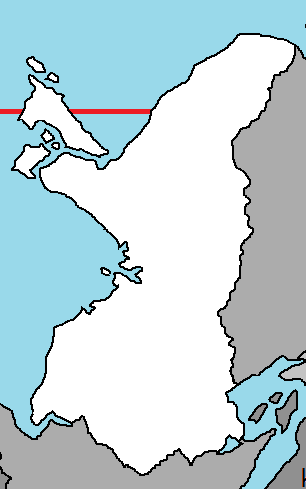Tine
Principality of Tine | |
|---|---|
|
Flag | |
 | |
| Capital and largest city | Tinegard |
| Official languages | Tinegardish, Bremic |
| Demonym(s) | Tinegardian |
| Government | Semi-constitutional monarchy |
• Prime Minister | Svenn Trande |
• Monarch | Martin II |
| Legislature | Parliament |
| Establishment | |
• Foundation | 842 |
• Parliamentary Republic | June 10th, 1940 |
| Population | |
• Estimate | 5,401,376 |
| GDP (PPP) | 2020 estimate |
• Total | $275 billion |
| GDP (nominal) | 2020 estimate |
• Total | $281 billion |
| Gini (2019) | 25.4 low |
| HDI (2019) | very high |
| Currency | Tine Krone |
| Date format | dd.mm.yyyy |
| Driving side | right |
Tine also officially known as the Principality of Tine is a small nation in eastern Nortua which borders Candatora to the south. Tine is an old nation with few cities and towns on the coastline to the Northern Ocean. The nation was formed in 842 after the Wars for Tinegardian Unification. Starting in the 17th century, Tine established itself as a prominent trading nation and naval power in the Northern Ocean. During this period, the famous Royal Tine Navy Academy was established. Tine attempted many times through the 17th and 18th centuries to control the flow of trade in the Northern Ocean to no avail. Tine has a thriving agricultural and fishing economy due to the proximity of the Northern Ocean. Tine embraced industrialization at a later point in history than most nations in Nortua due to the large population of agrarian settlements and workers.
Martin II of the House of Harsson is the current Prince. Svenn Trande has been Prime Minister since 2019. As a semi-constitutional monarchy, Tine divides state power between the parliament, the cabinet and the supreme court, as determined by the 1940 Constitution. Tine was neutral during the World War. Tine maintains both administrative and political subdivisions on two levels: counties and municipalities. The Bremic people have a very high amount of self determination and influence over their traditional territory through the Bremic Council. Tine has socialized healthcare, housing, welfare, social security, and education but still retains characteristics of capitalism and private industry. Tine's petroleum industry accounts for a quarter of the country's Gross Domestic Product. Since the late 20th century, Tine has been a member of the CCA.
History
Prehistory
The first inhabitants of Tine were the Harnesons which were paleolithic hunter-gatherer nomads who traversed the forests of Tine. The culture is named after the city of Harnes, where wooden spears and arrows were evacuated 25 km (15.53 mi) north of the city. Earliest traces of Tinegardian settlement are found along the coasts. The oldest discovery of stone tools from the Jarska culture in Tine date back to 3000 BCE in Staberg and near Varland.
Tinegardian Unification
Nortuan Union
Main article: Nortuan Union
The Besmenian-Tinegardian War
Main article: Besmenian-Tinegardian War
From October 28th 1844 to July 11th 1850, the Kingdom of Besmenia fought the Nortuan Union over Heulania territory of the former Nortuan Union with a large majority of Besmenian speakers. The Nortuan Union was defeated after the Battle of Laitstadt and the signing of the Besmenian-Tinegardian Treaty of 1850
Principality of Tinegard
Geography
Climate
Environment
Politics and government
Administrative Divisions
Main articles: Tinegardian Counties and Tinegardian Municipalities
Law Enforcement
Tine's laws are enforced by the Tinegardian Civil Police. It is a police service made up of 16 Municipal Police Districts. Tine has several police agencies for specialized work such as the Tine Criminal Investigation Service. The institutional framework of Tine's law enforcement is perceived as being held to a high amount of accountability, transparency, and integrity.
Military
Main article: Tine Armed Forces
The Tine Armed Forces number about 25,000 personnel, including civilian employees. According to 2005 mobilization plans, full mobilization produces approximately 90,000 combat personnel. Tine has conscription (including 6-12 months of training.) The Armed Forces are subordinates to the Ministry of Defense. The Commander-In-Chief is Martin II. The military of Tine is divided into the following branches: the Tinegardian Army, the Royal Tine Navy, the Royal Tine Airforce, and the Royal Tine Guard.
Foreign relations
See also: Besmenia-Tine relations
Tine is a member of the Crown Coalition of Albatross and the Alliance of Nortuan States. Tine maintains very strong ties to Besmenia even after the Besmenian-Tinegardian War. The foreign policy of leaders since the writing of the 1940 Constitution has been to avoid intervention and international conflicts. As such, Tine did not intervene in the World War.
Economy
Energy
Industry
Infrastructure
Transport
Demographics
Population
Tine's population was 5,401,376 as of the fourth quarter of 2021. Tinegardians are an Eastern Nortuan people. Since the West Besmenian Revolution and the end of the World War, Tinegard has attracted immigrants from Besmenia and other Nortuan nations.
The Bremic people are indigenous to the Far North and have traditionally inhabited the Island of Staheim. The Tinegardian government tried to assimilate the Bremic people, encouraging them to adopt the language, culture, and religion. The Tinegardianization process resulted in many families of Bremic ancestry to identify as ethnic Tinegardian.
Education
Religion
Culture
Music and art
Cuisine
Sports
Sports are a central part of Tinegardian culture. Popular sports include football, ski jumping, cross-country skiing, speed skating. Tine's most famous football club is Tinegard FK.
Media
Film
See also: Tinegardian Cinema
Tinegardians celebrate film and cinema immensely. Filming in Tine is also quite popular due to the scenery and location. Most notable films produced in Tine are Midnight (2019) and Dark Seal (1957).


